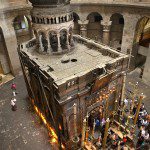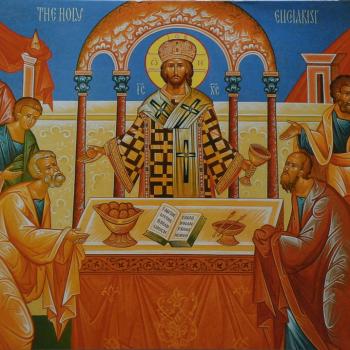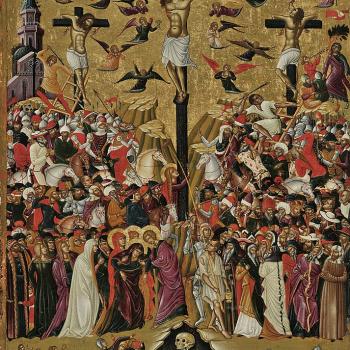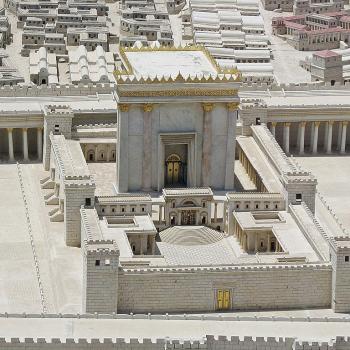![Rābiʻa al-ʻAdawiyya al-Qaysiyya [Public domain], via Wikimedia Commons](https://wp-media.patheos.com/blogs/sites/637/2016/08/Rabia_al-Adawiyya-300x166.jpg)
O Lord, if I worship you out of fear of hell, burn me in hell. If I worship you in the hope of paradise, forbid it to me. And if I worship you for your own sake, do not deprive me of your eternal beauty. [1]
Many come to know this must be true, and give an intellectual ascent to it, but few come to truly know it in their spiritual life. Instead, we seek after God with a lesser form of love. We seek after God but we find our earthy desires get in the way, focused as they are, in and on our attachment to the self. We desire God for what God can do for us. We do not let go of the self, and so we never show true love for God as we are unwilling to imitate Jesus and crucify ourselves for our love of God. And yet that is exactly what we are told is the perfection of love: “Greater love has no man than this, that a man lay down his life for his friends” (Jn. 15:13 RSV). God, who is love, reveals that love in the kenosis of the Logos, the Son of God, who went so far as death to raise us up by his love.[2]
Rābiʻa was stalwart in regard to this truth, and she was known to call many of the Muslim elites of her age evil because they held on to themselves and did not truly give themselves over to God with true love and devotion. “It is an evil servant who worships his Lord out of fear or out of desire for reward.”[3] God deserved more love and devotion than this. “Wouldn’t he deserve to be worshiped without intermediary?”[4]
The key is detachment – God’s glorious presence must blind us so much that nothing else compares, so that we can face the fires of hell and it would be as if nothing. Whatever wounds we face, whatever honors we receive, if we truly see and experience God, they will go unnoticed. “No one is sincere in his claim who does not forget the wound of the blow in the vision of his master.”[5] Indeed, her heart became so filled up with the love of God, and the vision and experience of God blinded her from all other things, she even said she has no room for hatred of Satan or love for Muhammad in it.[6] Her focus was on God alone. Her message as how we should live this out could be summed up by the explanation of a gift she gave to Hasan al-Basri – a piece of wax, needle and some hair: “Like the wax, give light to the world as your yourself burn. Like the needle, be naked and work continually. When you have achieved these two things, be like the hair, so your work will not be in vain.”[7]
A great Muslim woman had been touched by God and demonstrated God’s wisdom in a way that she puts to shame many Christians who would otherwise deride Muslim women as having an inferior understanding of God’s love. She might have not known the full ramifications of God’s love in and of God in relation to the incarnation, but she understood the incomparable goodness of God ‘s love and what that love asked for us in return. Love seeks after love, pure self-giving love with pure self-giving love. She knew that we must forego all egotism with its desires if we truly want to be lovers of God. If we hold onto some desire, we hold on to the self, and so have yet to attain true and perfect love which must transcend all desires and receive God in apatheia, as St. Peter of Damaskos declared, “Through dispassion a man enters into perfect, unfaltering love; for he understands his own nature – what it was before birth and what it will be after death. For moral man is nothing but a slight, short-lived stench, baser than any other created being.”[8] Obviously, it is not just dispassion which is needed; dispassion is the foundation by which we can open ourselves to God and let ourselves be crucified with Christ and truly rise in him in glory. We must go all the way to the purity of silence if we want to hear the Word in purity, as Evagrios explained: “One who has attained dispassion has not necessarily achieved pure prayer. For he may still be occupied with thoughts which, though dispassionate, distract him and keep him far from God.”[9]
![Christ Embracing St. Bernard. By Francisco Ribalta [Public domain], via Wikimedia Commons](https://wp-media.patheos.com/blogs/sites/637/2016/08/Francisco_Ribalta_-_Christ_Embracing_St_Bernard_-_WGA19350-212x300.jpg)
And God deserves to be loved for himself, even by the unbeliever, for even if he does not know Christ, he knows himself. No one, not even an unbeliever, can be excused. If he does not love God with all his heart, all his mind, and all his strength. An inborn sense of justice in him, which reason recognizes, cries out that he ought to love him with all his powers, for he knows that he owes him everything.[10]
Although there is a reward which comes about as a result of a pure love for God, St. Bernard also says, following Rābiʻa, that this should not be in our thoughts; true love will receive the reward of love, but such love will not think of or expect such reward:
True charity cannot be empty, but it does not seek profit, “for it does not seek its own benefit” [1 Cor. 13:5]. It is an affection, not a contract. It is not given or received by agreement. It is freely given; it makes us spontaneous. True love is content. It has its reward in what it loves. For if you seem to love something, but really love it for the sake of something else, you actually love what you are pursuing as your real end, not what is a means to it. [11]
But there is something higher. There is a transcendence to love where we can unite ourselves to the love which is God and find ourselves loving all things in our love for God. As St. Bernard explained, there are many stages on the path to our perfect love for God, starting with a very impure and selfish love but ending with a love for God which unites us with God and loves all things in the love of God itself. Our self, once it has been crucified and given over to God rises in him and experience union with him, and ends up acting in love following God’s act of love:
To live in this way is to become like God. As a drop of water seems to disappear completely in a quantity of wine, taking the wine’s flavor and color; as red-hot iron becomes indistinguishable from the glow of the fire and its own original form disappears; as air suffused with the light of the sun seems transformed into the brightness of the light, as if it were itself light rather than merely air; so, in those who are holy, it is necessary for human affections to dissolve in some ineffable way and be poured into the will of God.[12]
This higher stage is found in and through the resurrection, in what comes after the death to the self, showing what we seek is not nihilism but its opposite, of self-transcendent love which unites us with God and so forms the means by which God is able to be said to be all in all. [13] We must first, however, accept the path of the cross, to take up our cross and follow Christ to the death of the self, to the dispassioned silence of death, where we find our cares pass away as we truly leave ourselves entirely to the love and will of God. Rābiʻa points the way. A Muslim points the way showing it is indeed possible!
Will we follow?
[1] Michael A. Sells, trans. and ed., Early Islamic Mysticism: Sufi, Qur’an, Mi`raj, Poetic and Theological Works (New York: Paulist Press, 1996), 169. Taken from ‘Attar’s Memorial of the Friends of God.
[2] The incarnation is the ultimate revelation of God and what love in God is like. It is self-emptying, which is why the Father is able to eternally generate the Son, and why the Holy Spirit is able to proceed from the Father and through the Son. In each, the generation of the Son, and the procession of the Spirit, there is a different from of kenosis, a different form of self-denying love being manifested, to allow God to truly be love.
[3] Sells, Early Islamic Mysticism: Sufi, Qur’an, Mi`raj, Poetic and Theological Works, 166.
[4] Ibid., 166.
[5] Ibid., 168.
[6] See ibid., 163.
[7] Ibid., 161.
[8] St. Peter of Damaskos, “The Seven Commandments,” in The Philokalia: The Complete Text. Volume Three. trans. G.E.H. Palmer Philip Sherrard and Kallistos Ware (London: Faber and Faber, 1986), 96.
[9] Evagrios the Solitary, “On Prayer,” The Philokalia: The Complete Text. Volume One. trans. G.E.H. Palmer Philip Sherrard and Kallistos Ware (London: Faber and Faber, 1983), 62.
[10] St. Bernard of Clairvaux, “On Loving God” in Bernard of Clairvaux: Selected Works. trans. G.R. Evans (New York: HarperOne, 2005), 55.
[11] ibid., 67-8.
[12] Ibid., 79-80.
[13] See ibid., 80.
Stay in touch! Like A Little Bit of Nothing on Facebook:
A Little Bit of Nothing

















